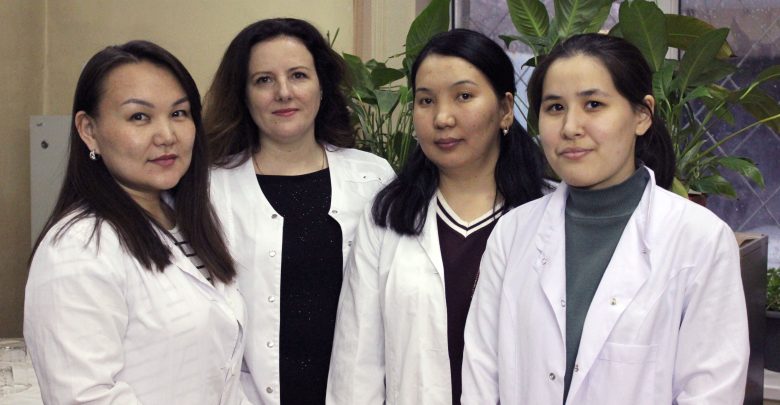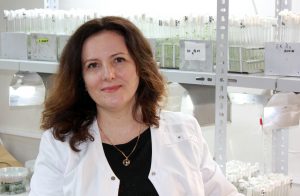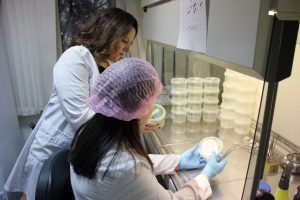
A brief history of the Laboratory
The Laboratory of Plant Bioengineering was organized in 1984 with the aim of developing and improving cellular technologies for obtaining and propagating new forms of agriculturally valuable plants with desired properties based on somatic hybridization and cell selection, as well as studying the mechanisms of plant resistance to major abiotic and biotic stress factors at the cellular level. The organizer and first head of the laboratory was a Professor Murat Karabaev, Doctor of Biological Sciences. From 1998 to 2006 the laboratory was led by Zhenis Kadyrovich Zhardemaly, Ph.D. in biology. From 2006 to 2010 head of the laboratory – Zhanikha Tureevna Lesova. Ph.D. in biology. Since 2010 the laboratory is led by Malakhova Natalya Petrovna, Ph.D in biology.
Malakhova Natalya Petrovna
Ph.D. in biology
Head of the Laboratory of plant bioengineering
Phone: +7 (727) 293-73-06
E-mail: tasha_malakhova@mail.ru
Natalya Malakhova graduated from the biology faculty of al-Farabi Kazakh National University in 1995. She is a specialist in the field of molecular biology and plant genetic engineering, biotechnologist and has more than 60 publications. She was a Scientific Director of nine (9) grants. She is an Associate Professor of Satbayev University, supervisor for PhD-doctoral, undergraduates and graduate students; author of syllabuses, lectures, practical courses and tests for exams in biotechnology. She was awarded the diploma “Kurmet gramtasy” of the Ministry of Education and Science of the Republic of Kazakhstan in 2019.
The main directions of research activities
The main areas of work of the laboratory are the development of fundamental and applied aspects of biotechnology and plant cell biology with the subsequent implementation of the results of scientific research in agricultural practice.
Fundamental research conducted at the Laboratory
- Development of new methods of cell selection for the directed accelerated selection process of the most important agricultural crops of Kazakhstan.
- Obtaining, on the basis of cell selection and somatic hybridization, initial lines of priority agricultural plants with increased resistance to unfavorable growing factors (salinity, drought, fungal diseases) to create new varieties.
- Plant genetic engineering: obtaining new lines of wheat and potatoes based on cisgenic technology.
- Development of methods for the biotechnological production of elite virus-free seed potatoes to ensure seed production and expand the areas of cultivation of domestic varieties in the Republic of Kazakhstan
- Development of technologies for clonal micropropagation of rare and endemic species, varieties and forms of plants in Kazakhstan to preserve the gene pool of valuable species.
- Creation of an in vitro culture bank.
Applied aspects of scientific activity of the Laboratory
- Production of healthy potato planting material on a virus-free basis, obtained by in vitro method for use in elite potato seed production.
- Rehabilitation and micropropagation for mass reproduction of
 ornamental, shrub and woody, agricultural and rare species of plants in Kazakhstan.
ornamental, shrub and woody, agricultural and rare species of plants in Kazakhstan. - Evaluation of potato seed material for viral diseases.
Research projects
2021-2022
Project “Monitoring of Erwinia amylovora strains common on wild and cultivated apple trees of the genus Malus spp., and development of practical recommendations to prevent the spread of fire blight among endemic plants of the Rosacea family (rosaceae)” within the framework of STP OR11465447 “Development of highly sensitive molecular biological, biochemical tests detection of pathogens that affect the consumer qualities of the final product, based on the monitoring of pathogens of agricultural crops, scientific supervisor – Malakhova N.P., Ph.D.
2018-2020
АР05136045 “Obtaining new lines of wheat and potatoes based on the application of a complex of innovative approaches of genetic engineering and cell technologies”, scientific supervisors – Malakhova N.P. Ph.D., Skiba Y.A. Ph.D.
2018-2020
GF AR05136045 “Obtaining new lines of wheat and potatoes based on the use of a complex of innovative approaches to genetic engineering and cell technologies”, scientific supervisor – Malakhova N.P. Ph.D.
2015 – 2017
Project 2194 / GF4 “Creation of the scientific foundations for the biotechnological production of elite virus-free seed potatoes to ensure seed production and expand the cultivation areas of domestic varieties in the Republic of Kazakhstan”, scientific supervisor – Malakhova N.P. Ph.D.
2014-2016
The project “Creation of new improved potato lines with increased resistance to fusarium based on bioengineering and plant cell breeding methods” within the framework of the STP “Development of scientific foundations for increasing the resistance of wheat and potatoes to fusarium and viroids based on methods of molecular and cellular biology and the creation on their basis of initial lines and diagnostics for accelerated selection, principal investigator – Malakhova N.P. Ph.D.
2013 – 2015
Project 1477 / GF “Obtaining drought and salinity resistant potato lines by cell selection and studying the role of the antioxidant system in the biochemical mechanisms of resistance formation”, scientific supervisor – Malakhova N.P. Ph.D.
2012-2014
The project “Microcloning and cultivation of saxaul plants in vitro for the restoration of desert ecosystems in Kazakhstan” within the framework of NTP O.0592 “Development of domestic genomic-proteomic and cellular technologies for the needs of medicine, agriculture and environmental protection in Kazakhstan”, principal investigator – Malakhova N.P. Ph.D.
Research methods
 To conduct scientific and applied research in the laboratory, modern and widely used methods and approaches of cell biology and biotechnology are used, including: the method of healing plants by chemo- and thermotherapy, the method of isolating apical meristems, methods of plant regeneration and their microclonal propagation, methods of cell culture under in vitro conditions, analysis and selection of virus-free material using the ELISA method, methods of plant cultivation under in vitro and in vivo conditions.
To conduct scientific and applied research in the laboratory, modern and widely used methods and approaches of cell biology and biotechnology are used, including: the method of healing plants by chemo- and thermotherapy, the method of isolating apical meristems, methods of plant regeneration and their microclonal propagation, methods of cell culture under in vitro conditions, analysis and selection of virus-free material using the ELISA method, methods of plant cultivation under in vitro and in vivo conditions.
Scientific achievements of the Laboratory
- A method for obtaining somatic hybrids of wheat and potatoes has been developed. The conditions for isolating, cultivating, merging and hybridizing protoplasts from suspension cultures and leaf mesophyll and obtaining regenerated plants were optimized.
- Drought-resistant potato lines have been obtained, which are undergoing field trials in Almaty and Karaganda regions.
- High-yielding wheat lines resistant to phytopathogens have been identified and tested in the soil and climatic conditions of Akmola, Karaganda and Almaty regions.
- A technology has been developed for the use of chlorella microalgae in crop production and biotechnology as a growth stimulant.
- A method has been developed for obtaining seeds from regenerated wheat plants grown in an aeroponic plant.
 Каз
Каз Рус
Рус Eng
Eng